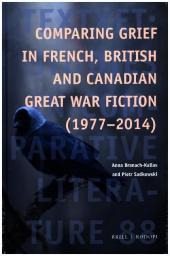 Neuerscheinungen 2018Stand: 2020-02-01 |
Schnellsuche
ISBN/Stichwort/Autor
|
Herderstraße 10
10625 Berlin
Tel.: 030 315 714 16
Fax 030 315 714 14
info@buchspektrum.de |

Anna Branach-Kallas, Piotr Sadkowski
(Beteiligte)
Comparing Grief in French, British and Canadian Great War Fiction (1977-2014)
2018. VIII, 252 S. 235.0 mm
Verlag/Jahr: BRILL; BRILL RODOPI 2018
ISBN: 9004364773 (9004364773)
Neue ISBN: 978-9004364776 (9789004364776)
Preis und Lieferzeit: Bitte klicken
This study of historical, sociological, philosophical and literary sources, shows how, by both consolidating and contesting national myths, fiction continues to construct the 1914-1918 conflict as a cultural trauma, illuminating at the same time some of our most recent ethical concerns.
Comparing Grief in French, British and Canadian Great War Fiction (1977-2014) offers a comparative analysis of twenty-three First World War novels. Engaging with such themes as war trauma, facial disfigurement, women´s war identities, communal bonds, as well as the concepts of mourning and post-memory, Anna Branach-Kallas and Piotr Sadkowski identify the dominant trends in recent French, British and Canadian fiction about the Great War. Referring to historical, sociological, philosophical and literary sources, they show how, by both consolidating and contesting national myths, fiction continues to construct the 1914-1918 conflict as a cultural trauma, illuminating at the same time some of our most recent ethical concerns.
Acknowledgements Introduction 1 Faces  Between Stigmatisation and Sacralisation: The Officers´ Ward by Marc Dugain From Destruction to Reconstruction: My Dear, I Wanted to Tell You by Louisa Young Facial Disfigurement and Shell Shock: Tell by Frances Itani Abjection and Precarity: The Great Swindle by Pierre Lemaitre Aversion and Masks: Toby´s Room by Pat Barker 2 Women  Maternal Pacifism: Dans la guerre by Alice Ferney Grief and Betrayal: Zennor in Darkness by Helen Dunmore Gendered Disorder: My Dear, I Wanted to Tell You by Louisa Young Asymmetric Similarities: Deafening by Frances Itani Empathetic Unsettlement: Les Fleurs d´hiver by Angélique Villeneuve 3 Communities  Egoism and Brutalisation: By a Slow River by Philippe Claudel Adoptive Kinship: The Heroes´ Welcome by Louisa Young Community of Memory: Broken Ground by Jack Hodgins Canada Divided: The Draft Dodger by Louis Caron and A Secret Between Us by Daniel Poliquin Community of (Not)Seeing: In Desolate Heaven by Robert Edric 4 Mourners  Psychic Crypt: The Stone Carvers by Jane Urquhart The Illness of Mourning: Toby´s Room by Pat Barker The Cult of Mourning: The Great Swindle by Pierre Lemaitre Infinite Grief: Le Monument. Roman vrai by Claude Duneton 5 Post-Memory  An Intimate "Archaeology of Knowledge": The Wars by Timothy Findley Writing as the Act of Sepulchre: The Acacia by Claude Simon A Family´s Compiègne Wagon: Fields of Glory by Jean Rouaud Female Seekers: In Pale Battalions by Robert Goddard and Birdsong by Sebastian Faulks Homoerotic Post- Memory: Douze lettres d´amour au soldat inconnu by Olivier Barbarant Conclusion Bibliography Index
"Significantly, in contrast to the prevailing analytical framework, Branach-Kallas and Sadkowski do not focus on literary representations of combat and front life, but on texts that depict the long-lasting aftermath of the war in order to investigate the psychological and social effects of the conflict and to inquire into why the war refuses to be buried in the past. Comparing Grief explores the "changed reality" after the Great War and analyses the cultural trauma produced by the war in France, Canada, and Britain, focusing on shell-shock and the ensuing disintegration of individual identity and communal bonds. "
- , Katarzyna Wieckowska, in Anglica: An International Journal of English Studies , Vol. 27.3 (2018), pp. 249-255


